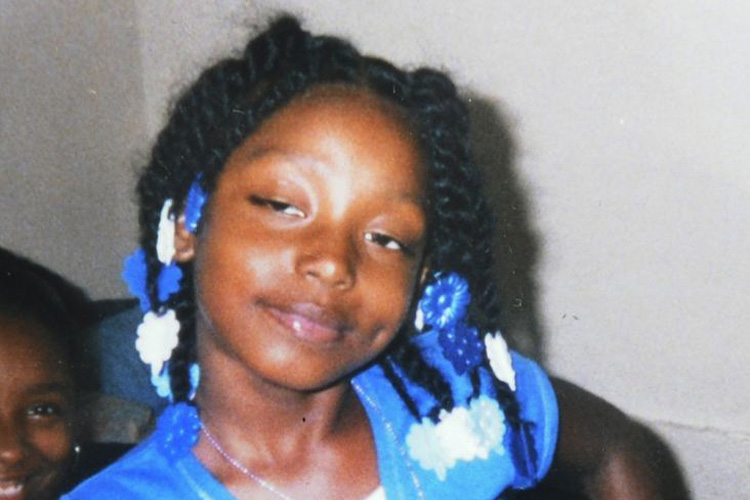 |
|---|
| This undated family photo shows Aiyana Stanley-Jones, 7, who was shot and killed May 16, 2010, by a shot from a Detroit police officer during a raid to arrest a murder suspect. (AP Photo) |
 
|
Detroit officer on trial in death of 7 year old girl
Associated Press
Wed May 29, 2013
DETROIT - Police accompanied by a reality TV crew fired a stun grenade through a window as they raided a Detroit home in search of a murder suspect. A gunshot then went off inside, fatally striking a 7-year-old girl in the head while she slept on a couch.
Now, three years later, Officer Joseph Weekley goes on trial in the death of Aiyana Stanley-Jones. Jury selection starts Wednesday.
Weekley, charged with involuntary manslaughter, is accused of acting with gross negligence when he didn't prevent his gun from firing during the chaos that followed the use of a "flash-bang" device.
The shooting shocked Detroit. Cooperation between police and the reality show, "The First 48," was banned in the aftermath, and the chief soon resigned at the mayor's request when it was revealed that he was working on plans for another TV show.
But beyond the city, there was little, if any, impact on the hunger for real-life police drama on the small screen. "Cops," in its 25th year, still is on the air, moving from Fox to Spike TV this fall. "The First 48" has been on A&E Networks since 2004.
"They're fascinating and compelling," said Robert Thompson, director of the Bleier Center for Television and Popular Culture at Syracuse University.
"Everyone has built into them an inherent interest in encounters with police," he said. "We know how our adrenaline gets going when we see that flashing light behind us when we're going too fast on the highway. ... Every now and again an incident happens, but it isn't enough to trump the momentum this genre has."
The loud, smoky device used in the Detroit raid is intended to startle and confuse people as officers swarm a scene. But some critics of the police department's tactics believe it was used in the fatal raid simply to satisfy a crew from "The First 48," a show that focuses on the crucial early stages of homicide investigations.
Weekley's trial could reveal how the TV crew's presence influenced decisions that May 2010 night.
"This was essentially a military assault on a private dwelling," said Ron Scott, spokesman for a watchdog group, Detroit Coalition Against Police Brutality. "I think the administration of the police department wanted to show Detroit was tough on crime and show something exciting for television.
"Police work is not television, and television work is not police work," he said. "The two combined to make it a horrific night."
Officers hunting for a suspect in the murder of a 17-year-old boy staked out a home that night on Lillibridge Street. Weekley was first through the door when the grenade went off during the midnight raid.
Police have said his gun accidentally discharged after he confronted or collided with Aiyana's grandmother. A bullet struck and killed Aiyana, one of four children inside.
Then-Police Chief Warren Evans apologized for the girl's death, telling her family, "I will never be able to put myself in your shoes." He promised a "painful self-examination" by the department but never explained why a stun grenade was necessary.
After that, officials declined to speak publicly about the raid because of a civil lawsuit and investigations that led to charges against Weekley.
Defense attorney Steve Fishman declined to comment ahead of the trial. But in court filings, he has knocked Wayne County prosecutors for trying to turn Weekley into a criminal. The maximum penalty for involuntary manslaughter is 15 years in prison.
Weekley "had nothing to do with the planning of the raid and was merely a police officer assigned to a certain position ... by a superior officer," Fishman said in the filings.
He said his client shouldn't be held responsible for the "ineptitude of the officer assigned to deploy" the stun grenade. The jury will see a demonstration of the device away from the courthouse.
Mayor Dave Bing banned reality TV crews from tagging along with police after Aiyana's death. Evans was forced out as chief two months after the shooting, partly because he was involved in planning a different reality show starring himself.
A&E declined to comment on whether Aiyana's death led to any changes in how "The First 48" crews do their job. A videographer, Allison Howard, is charged with perjury and withholding video crucial to the investigation. Her trial is set for June 24.
The Rev. Horace Sheffield III handled Aiyana's funeral and repeatedly has demanded a full accounting by police. He plans to attend the officer's trial.
"If those cameras had not been there, what would the outcome have been?" Sheffield said. "That's the important question to ask. It's a situation that cries out for justice."


 Share your thoughts in the Forum
Share your thoughts in the Forum